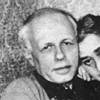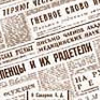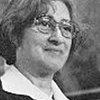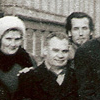Human Rights Movement: 1969-1979
In Moscow Sakharov combined work at FIAN on pure theoretical physics with increasing contacts with the emerging human rights movement. In 1970 Sakharov, with Soviet dissidents Valery Chalidze and Andrei Tverdokhlebov, founded the Moscow Human Rights Committee. In the movement he met Elena Bonner, who became his partner and companion-in-arms; they married in 1971. She gave him a sense of personal happiness and greatly enhanced his contact with other people. Together they worked on articles, interviews, appeals, and demonstrations in defense of victims of political persecution and discrimination.
“Our society is infected... the Party apparatus of the government and the highest, most successful levels of the intelligentsia... are profoundly indifferent to violations of human rights, the interests of progress, the security and future of mankind.”
- Letter to Premier Brezhnev, 1971
As Sakharov’s public stature and international support grew, the regime put increasing pressure on him. Open letters were published denouncing Sakharov, some signed by members of the Soviet Academy of Sciences. Newspapers also published phony letters “from simple people” attacking him. The 1973 newspaper campaign targeted both Andrei Sakharov and Alexander Solzhenitsyn – two parts of the same headache for the Soviet Politburo. Sakharov strongly disagreed with Solzenitsyn’s vision of Russian national resurrection, but he always deeply respected the fearless voice of the author of The Gulag Archipelago. It was Solzhenitsyn, Nobel Prize laureate for literature of 1970, who in 1973 nominated Sakharov for the Nobel Prize for Peace.
Only a few individuals in the Soviet Union dared to defend “traitors” like Sakharov. In September 1973, writer Lydia Chukovskaya wrote and circulated a remarkable article, “The People’s Wrath,” which explained that Sakharov’s ideas had been distorted in the Soviet press. She noted, “He wrote several large essays known throughout the world, except to you, comrade Soviet people; essays in which he invited the people of the globe to stop stockpiling bombs and start stockpiling thoughts: how can humanity be saved from the threat of war?” In January 1974 Chukovskaya was expelled from the Soviet Writers Union, primarily because of her articles in defense of Sakharov.
Sakharov was awarded the Nobel Peace Prize in 1975, the first Russian to get this honor. The Nobel Committee’s official citation praised Sakharov for his “fearless personal commitment in upholding the fundamental principles for peace... Uncompromisingly and with unflagging strength Sakharov has fought against the abuse of power and all forms of violation of human dignity, and he has fought no less courageously for the idea of government based on the rule of law.”
“In a convincing manner Sakharov has emphasized that Man’s inviolable rights provide the only safe foundation for genuine and enduring international cooperation.”
- Nobel Prize citation, 1975
Soviet authorities did not allow Sakharov to travel abroad to receive the prize. His wife, Elena Bonner, who was then abroad, participated in the award ceremony in Oslo. On the day of the Nobel ceremony, Sakharov was in Vilnius attending the trial of Sergei Kovalev, a human rights activist.
Sakharov continued to develop his ideas on science and society. Among his prophetic suggestions was the idea – published in a futurological article in 1974 – of a publicly available global information system. This was 18 years before the World Wide Web’s first appearance.
“I foresee a universal information system [which] will give each person maximum freedom of choice...”
“I foresee a universal information system (UIS), which will give everyone access at any given moment to the contents of any book that has ever been published or any magazine or any fact. The UIS will have individual miniature-computer terminals, central control points for the flood of information, and communication channels incorporating thousands of artificial communications from satellites, cables, and laser lines. Even the partial realization of the UIS will profoundly affect every person, his leisure activities, and his intellectual and artistic development. Unlike television... the UIS will give each person maximum freedom of choice and will require individual activity. But the true historic role of the UIS will be to break down the barriers to the exchange of information among countries and people.” (Saturday Review/ World, 24 August 1974.)
Sakharov’s thoughts on the problems and goals of social development combined with his ever more active involvement in the human rights movement and led him to put forward the principle of human rights as a new basis of international and ecological politics. He became his country’s foremost defender of human rights.
“It’s very important to defend those who suffer because of their nonviolent struggle for an open society, for justice, for other people whose rights are violated. It is our duty and yours to fight for them. I think that a lot depends on this struggle -- trust between peoples, confidence in lofty promises, and, in the final analysis, international security.”
- letter to US President Jimmy Carter, 20 January 1977
The connection Sakharov saw between the violation of human rights and international violence has become increasingly recognized. Scholars find that nations with broad and solid political rights (that is, democracies) have rarely if ever warred on one another. But repression at home often leads to conflict abroad. See this essay (S. Weart) and this Democratic Peace site (R.J. Rummel).




